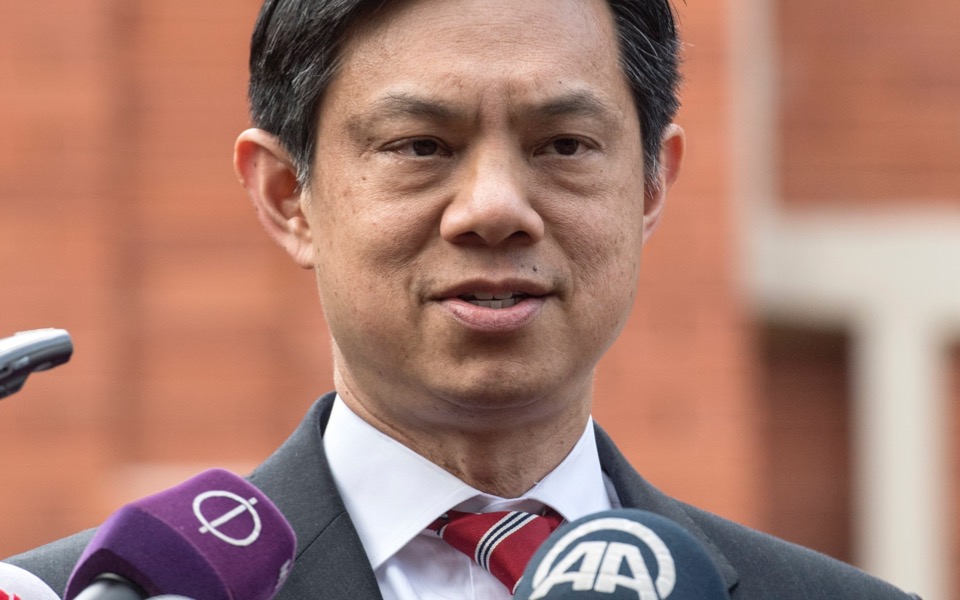Balkan borders are firmly set, says US official

America continues to have a strong presence and interest in the Balkans, and policy in Washington has not changed in that regard, Deputy Assistant Secretary for European and Eurasian Affairs Hoyt Brian Yee tells Kathimerini in an interview.
The American official stresses that existing borders in this sensitive part of the world are firmly set and not the subject of debate.
On the issue of recent tension between Greece and Albania over comments from Tirana suggesting plans for a “Greater Albania,” Yee clarified that Washington rejects such nationalist rhetoric wherever it comes from and calls on the leaders of the Western Balkans to avoid inflammatory and divisive rhetoric, and focus instead on reforms.
Regarding the ongoing dispute over the name of the Former Yugoslav Republic of Macedonia (FYROM) between Athens and Skopje, he says “that the door to NATO and the European Union is open” if the required reforms are carried out, and also stressed the need for a mutually acceptable solution “in the interest of Euro-Atlantic integration.”
What picture have you gleaned from your recent trip to the Western Balkans? Is the situation worrisome?
With our and Europe’s active engagement, we have seen some positive developments in the Western Balkans recently. Montenegro has joined NATO, Macedonia’s leaders have come together to form a new government, the Albanian opposition agreed to end its boycott and participate in elections on June 25, and Serbia opened two new European Union accession chapters this month. These steps forward demonstrate that hard work and persistence pay off, and that Balkan countries can achieve their goals when there is political will. Of course the region still faces significant challenges. These include, internally, fragile institutions, shortcomings in the rule of law, unfree media, and endemic corruption. External challenges include combating terrorism, managing migrant flows, and resisting outside attempts to derail democratization. In order to resolve these challenges, regional leaders will need to show political courage, cooperate with each other and make the decisions and steps necessary for greater stability and prosperity.
Some argue that tensions in the region are returning, in FYROM and in Albania for example, because Washington does not seem to be showing a particular interest in the area. Has something really changed in US policy on the Western Balkans after the change of leadership at the White House and the State Department?
America’s presence and interest in the Western Balkans remains very strong. Our policy has not changed. A stable, prosperous Western Balkans that is integrated into Europe and serves as a strong partner on counterterrorism and other shared interests will help make America safer, enhance the US economy and ensure peace in the region. To accomplish this goal, the countries of the Western Balkans need to commit themselves to the deep reforms needed to provide their citizens good governance, security and more jobs.
Are today’s borders in the Western Balkans a given for the US? I’m asking because a dialogue has begun, even if it is hush-hush for now, for “peaceful change” in an effort to settle some pending issues, such as for example between Kosovo and Serbia.
The borders of countries in the Balkans are clearly defined, internationally recognized and not a matter of serious dispute. Changing borders in the Balkans would not contribute to the security and stability of the region. On the contrary, as we know from experience, attempts to change borders in the region can be highly destabilizing. We urge politicians in the region to refrain from inflammatory and divisive rhetoric and focus instead on addressing the fundamental political and economic reforms necessary to advance their further integration into Euro-Atlantic institutions.
In some capitals, such as Belgrade, Skopje and even Moscow, concerns are being officially expressed over a possible destabilization of the Balkan peninsula, arising from the nationalistic rhetoric of Albanian leaders, which is viewed as an effort to create an agenda for a “Greater Albania.” What is the US’s position regarding such a prospect?
As I said before, we do not support redrawing the map in the Western Balkans and we reject ethno-nationalist rhetoric from any source. I am not aware of any serious effort to change borders in the region. We hope and expect that leaders in the region will continue to seek out opportunities to address the issues their citizens care about – for example economic growth. Leaders should also cooperate to reduce any ethnic or political tensions, and to resolve disputes in a manner that respects international law and norms.
Do you think that after the latest developments in FYROM the conditions for accelerating integration into NATO and the EU are being shaped, even if the name issue with Greece is still pending?
NATO and the EU have regularly reaffirmed that the door to membership is open to Macedonia. And NATO upholds its commitments. However, to become a member, Macedonia must convince NATO governments and parliaments it is meeting the standards set by these organizations. This means implementing needed democratic reforms, particularly related to the rule of law, and full implementation of the Przino Agreement. We hope that the leaders of Macedonia and Greece will find a mutually agreeable solution to the name dispute in the interest of Euro-Atlantic integration, economic prosperity, peace, and security in the region.
There is concern in Greece of a possible dangerous incident in the Aegean due to escalating aggression, as Athens notes, from Turkey? Do you see any such danger?
Our policy has not changed. As we have said, Turkey and Greece have long-established diplomatic channels for addressing Aegean issues. As a matter of principle, the United States supports the sovereignty of the countries in the region, including Greece and Turkey.





